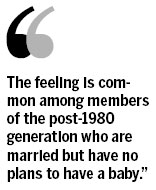Voices
Never being grandparents is too much to handle
By Wang Tingting (China Daily)
Updated: 2010-06-02 07:55
 |
Large Medium Small |
After the May Day holiday, one of my friends, who was married two years ago, complained that she had once again been pressured by her parents and relatives to have a baby as soon as possible.
"My mother grasped every opportunity to persuade me during the three-day holiday and even cited my pregnant childhood friends as examples," she told me.
"Although I have more than enough reasons not to have a child just yet, I could not see eye-to-eye with my parents and could hardly bear it anymore."
The feeling is common among members of the post-1980 generation who are married but have no plans to have a baby.
It is difficult for those couples because most parents think having a child is very important for the happiness and well-being of a family. They believe going childless means pity and loneliness for a person, especially after they get to a certain age. It is as if women without kids lack something for their whole life.
Surveys show that members of the post-1980 generation who are married but who do not have kids have generally chosen to be childless for one of two reasons.
Some love kids but believe they lack the economic power to have a baby.

Having become slaves to their homes and autos, they dare not have a baby and increase the burden because the cost of raising a child is becoming higher and higher, particularly in big cities.
For these people, having a baby means being boxed up for their entire lives because they cannot afford any risks, like unemployment, accidents and diseases.
Compared with people in this category, who may have a baby in later years when they become financially better off, the so-called DINK (double income, no kids) couples, who usually have good educations and relatively good incomes, seem more determined on the kids issue.
"I may be able to think of a billion ways to spend my life and money rather than raising a baby. A kid for me is like an unknown number only to cost me an unlimited amount of money and energy," said one of my friends. "Moreover, I'm making my contribution to reducing overpopulation."
White- and golden-collar workers, who regard their professional development as the most important part of their lives, also have other reasons not to have a child. They prefer to spend their holidays traveling overseas, exercising in the gym, having facials in beauty salons or feeding pets at home.
"Life is so hard, and I don't want to bring my child into the world and experience the cutthroat competition from the very beginning. I'm concerned whether kids have a healthy and secure environment to grow up in, like I did in my childhood," said Zou Yan, a marketing director at a famous overseas company in Beijing.
In addition, the increasing divorce rates in big cities constitutes another reason for a married couple's denial of having a baby.
Traditionally, it is thought that children need to be raised in a stable and harmonious environment. Single-parent families are still rarely accepted in Chinese society.
According to statistics, Beijing, with the highest divorce rate in China, had more than 30,000 registered divorces in 2009, which was more than 400 percent more than the number in 2001.